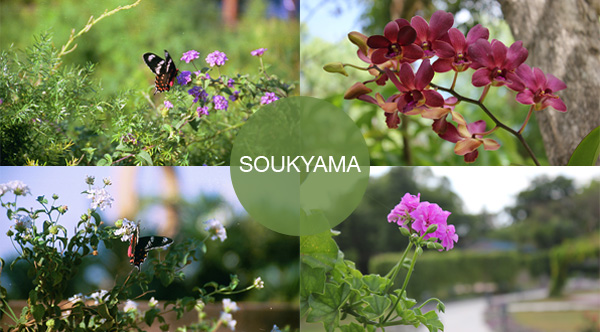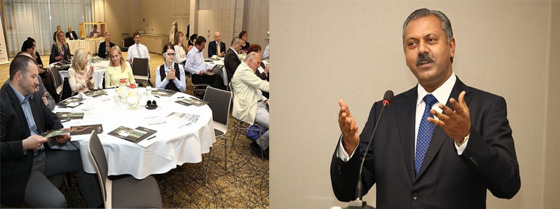|
ENewsletter of  www.soukya.com
www.soukya.com
|
||||

|
||||
|
Dear Friends, This newsletter is aimed at creating awareness on a chosen health issue or medical condition. We wish to educate people on the condition and its prevention. Also, how the different Systems of Medicine and Complementary Therapies help in treating the condition. This month we have focused on Stress which is relevant to all. Even if we cannot avoid it in our daily lives, we need to help ourselves cope with it better. - Dr. Issac Mathai M.D.(Hom),M.R.C.H. (Lond) and Mrs.Suja Issac M. Sc., M.Phil. (Foods & Nutrition) |
||||
| SOUKYA News | ||||
|
International Conference on Global Health Futures
|
||||
|
Dr. Mathai's presentation in Slovakia Dr.Mathai recently was invited by the American Chamber of Commerce in the Slovak Republic to give a presentation on "How to Benefit from Modern Medicine and Self healing powers of the Individual". This was organised by Mr. Vazil Hudák, State Secretary of the Ministry of Finance of the Slovak Republic. He also met with the Deputy Prime Minister of Finance of the Slovak Republic, Mr.Peter Kazimir.
|
||||
|
Dr. Mathai's Rural Holistic Health Centre
SOUKYA Foundation has established Dr Mathai's Rural Holistic Medical Centre (DMRC) functions at a Government Primary Health Centre Campus at Jadigenahalli Grama Panchayat in Hoskote Taluk. The building is a donation from SOUKYA and is a fully functional Medical facility with a Laboratory at a cost of Rs 45Lakh.(USD75000) SOUKYA Foundation was awarded AYUSH Grama project by the Department of AYUSH, Government of Karnataka. Dr Mathai's Rural Holistic Medical Centre takes care of 8 villages with a population of more than 10000.
|
||||
| Rejuvenation during Monsoon | ||||
|
Monsoon months from July to September is considered the best period to undergo Ayurvedic Rejuvenation treatments including the Panchakarma. The weather during these months is best suited to undergo the rejuvenation treatments which will help boost one's immunity, prevent the degeneration and ageing process in the body and achieve ultimate health. A minimum of 21 to 28 days stay is required. At SOUKYA special packages available for these months. Read More...
|
||||
| Meditation Spot at SOUKYA | ||||
|
A health drink for the monsoon: Monsoon is the time when the atmospheric temperature dips suddenly after the hot summer months. This reflects in the body too. We could keep the body warm with this simple recipe. Til juice: Soak 2 tablespoons of black sesame seeds for 3-4 hours. Add 2 tablespoons of grated jaggery( molasses), or jaggery syrup and grind it with water or diluted skim milk. Filter, and drink a glass of this juice either mid morning or mid after- noon. Sesame keeps the body warm and lubricates the joints. You get the added benefit of iron from the molasses too!
|
||||
| Stress Management at SOUKYA | ||||
|
Stress is defined as 'bodily or mental tension'. It may result from unpleasant events, like death or loss of a job or pleasant events like marriage or birth of a baby. The control we have over the stress in our lives is the key. For those who feel they are in control of their lives, the stress is minimal as compared to those who feel helpless often leading to depression. Read More...
Feel Rejuvenated and de-stressed after this monsoon.
|
||||
|
||||
 SOUKYA in collaboration with the College of Medicine, London, of which Prince Charles is a Patron, organised the International Conference on Global Health Futures in November 2013. This conference was a huge success and was attended by World Renowned speakers like Dr.Dean Ornish, Dr.Woodson Merrell, Dr.Graeme Catto, Dr.Michael Dixon, Nobel Laureate Archbishop Desmond Tutu and many more.
SOUKYA in collaboration with the College of Medicine, London, of which Prince Charles is a Patron, organised the International Conference on Global Health Futures in November 2013. This conference was a huge success and was attended by World Renowned speakers like Dr.Dean Ornish, Dr.Woodson Merrell, Dr.Graeme Catto, Dr.Michael Dixon, Nobel Laureate Archbishop Desmond Tutu and many more.

 Sit with the back straight and eyes closed, in any comfortable posture. Detach from the chain of thoughts; detach from the external sound. Slowly focus on the breaths. Follow the inhalations and exhalations. Observe the air passing in through the nostril, as you inhale and the air passing out through the nostrils with exhalation. Simply follow this without interfering with the pattern. Gradually you will notice the breaths getting deeper, slower and rhythmic, filling you with calmness. Your mind is focussed fully on the breaths and there are no other thoughts in the mind. Enjoy this state of total calmness!!!
Sit with the back straight and eyes closed, in any comfortable posture. Detach from the chain of thoughts; detach from the external sound. Slowly focus on the breaths. Follow the inhalations and exhalations. Observe the air passing in through the nostril, as you inhale and the air passing out through the nostrils with exhalation. Simply follow this without interfering with the pattern. Gradually you will notice the breaths getting deeper, slower and rhythmic, filling you with calmness. Your mind is focussed fully on the breaths and there are no other thoughts in the mind. Enjoy this state of total calmness!!!